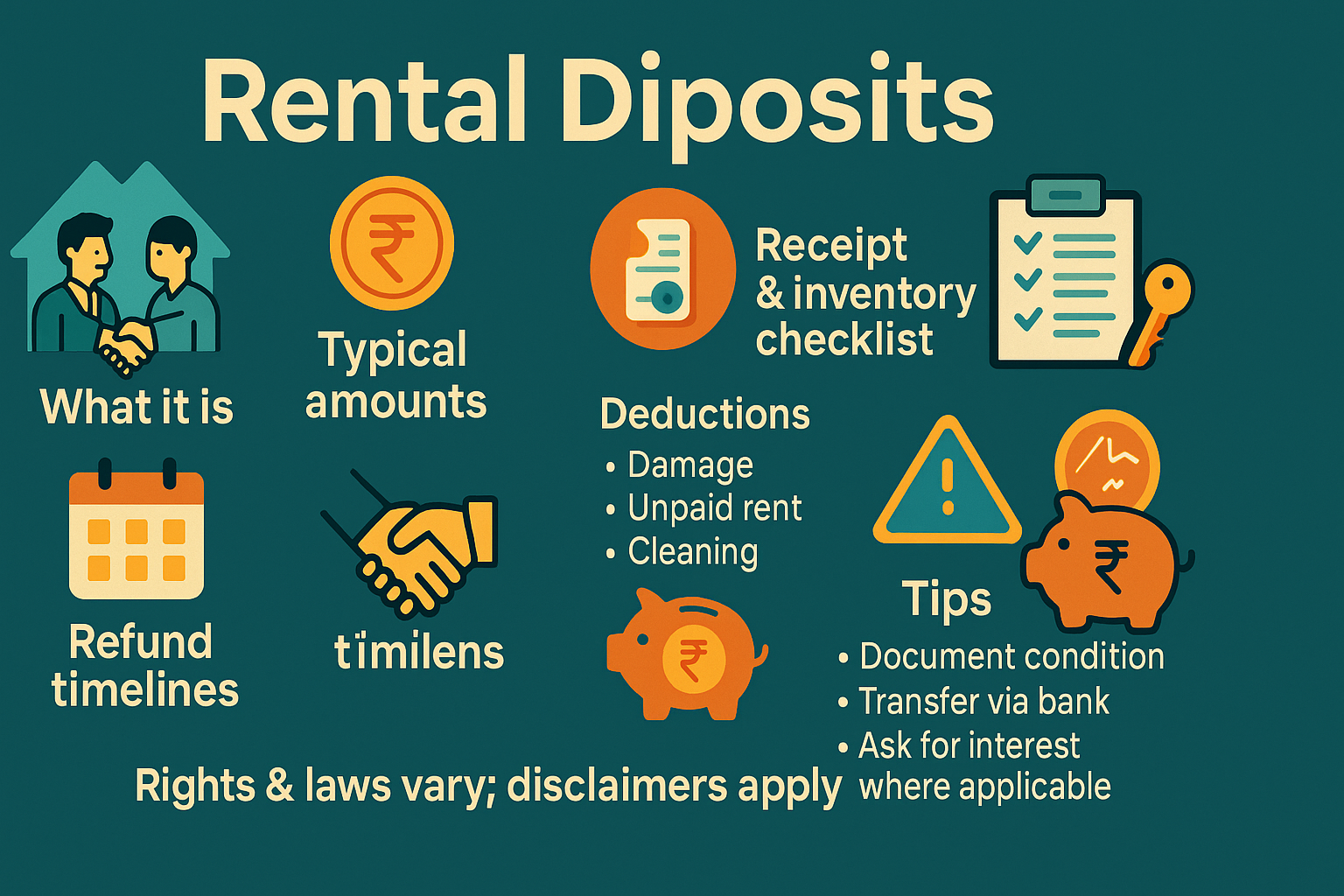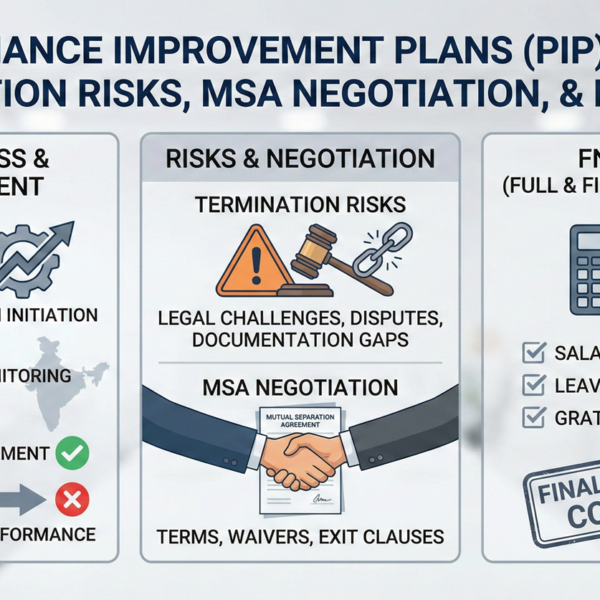It’s a moment every tenant dreads: you’ve moved out, but your landlord is withholding a chunk of your security deposit for “painting charges.” Is this legal in India? The answer is often no, but it depends entirely on your rental agreement and the crucial difference between actual damage and “normal wear and tear.” This comprehensive guide breaks down your legal rights, helps you analyze your specific situation with interactive tools, and provides a step-by-step plan—including a legal notice template—to get your money back.
Can Your Landlord Deduct for Painting? A Tenant's Guide to Security Deposits in India
Navigating India's tenancy laws can be tricky. We break down your rights when it comes to painting charges and your security deposit.
Check Your Situation
Answer three quick questions to get an instant analysis of your legal standing.
The question isn't simple. Across India, the legality of a landlord deducting painting charges from your security deposit depends on a crucial distinction: is it routine maintenance or tenant-caused damage? The answer lies in a mix of state laws, your rental agreement, and the concept of "normal wear and tear."
Normal Wear & Tear vs. Actual Damage
This is the most important concept to understand. 'Normal wear and tear' is the natural deterioration that happens over time from living in a property. Your landlord cannot charge you for this. 'Damage' is caused by negligence or abuse, and you are financially responsible for it.
| Condition / Issue | Classification | Who Pays? |
|---|---|---|
| Faded paint from sunlight | Normal Wear & Tear | Landlord |
| Large gouge or hole in the wall | Tenant-Caused Damage | Tenant (from deposit) |
| Minor scuff marks near doorways | Normal Wear & Tear | Landlord |
| Unapproved custom paint job | Tenant-Caused Damage | Tenant (from deposit) |
| A few small nail holes from pictures | Normal Wear & Tear | Landlord |
| Crayon or extensive ink marks on walls | Tenant-Caused Damage | Tenant (from deposit) |
How Tenancy Duration Affects "Wear & Tear"
The longer you live in a place, the more deterioration is considered "normal." A landlord's expectation for a property after a 5-year tenancy is very different from a 6-month one. Use the slider below to see how the responsibility shifts.
The Legal Framework: Statute vs. Contract
To understand your rights, it's essential to know the two main sources of law that govern your tenancy: the state's Rent Control Act and your individual rental agreement. They work together to define the rules.
Statutory Duties: What the Law Demands
Most states have tenancy laws (like the West Bengal Premises Tenancy Act, 1997) that set baseline responsibilities. A key provision in many of these acts is the landlord's duty to "keep the premises in good and tenantable condition." This means the landlord is responsible for routine maintenance to ensure the property is habitable, which includes addressing issues like paint peeling due to age or humidity. On the other hand, the tenant's duty is to use the property responsibly and avoid causing damage beyond normal wear and tear.
The Power of Your Rental Agreement
Where state laws are silent—especially on the specifics of security deposits—your rental agreement becomes the most powerful legal document. It's a contract that can add specific obligations on top of the general law. This is why the clauses within your agreement are so critical in determining the outcome of a dispute over painting charges.
A Deeper Look at Your Security Deposit
A security deposit is not the landlord's money. It is your money held in trust by the landlord as a safeguard against specific, quantifiable losses you might cause. Upon moving out, it must be returned to you, minus any legitimate deductions.
Permissible vs. Impermissible Deductions
A landlord can legally deduct from your deposit for:
- Unpaid rent and utility bills.
- Costs to repair actual damage you caused (e.g., fixing a large hole in the wall).
- Costs for extensive cleaning if the property is left in an unlivable state.
A landlord cannot deduct for:
- Routine maintenance, like repainting faded walls.
- Upgrades to the property (e.g., installing new, more expensive fixtures).
- Fixing issues that fall under 'normal wear and tear'.
The Burden of Proof: It's on the Landlord
This is a critical point for tenants to understand. If a landlord deducts from your security deposit, the legal responsibility (the "burden of proof") is on them to justify it. They cannot simply state a charge; they must prove the deduction was for a legitimate and reasonable cost to repair damage you caused. This requires evidence, such as:
- Dated photos or videos showing the condition of the property before you moved in and after you moved out.
- Itemized invoices and receipts for the repairs or painting work done.
Without this proof, a landlord's claim is significantly weakened in any legal dispute. A simple handwritten note with an arbitrary amount for "painting" is not sufficient evidence.
Your Rental Agreement is Key
While tenancy laws (Rent Control Acts) vary by state, your rental agreement is universally the most powerful document. It defines the terms you and your landlord agreed to. Here are the three common scenarios:
1. Explicit Painting Clause
If your agreement has a clause like, "One month's rent will be deducted for repainting," it is likely enforceable across India. You agreed to it when you signed.
2. Ambiguous Clause ("Normal Wear & Tear")
A clause stating the property must be returned in the same condition "subject to normal wear and tear" protects you. The landlord must prove you caused actual damage beyond this accepted standard.
3. No Painting Clause
If the agreement is silent on painting, you are in the strongest position. The default responsibility for routine maintenance generally falls on the landlord under most state laws.
Your 3-Step Action Plan to Contest Unlawful Deductions
Document & Negotiate
Gather evidence (photos, agreement). Send a polite but firm written request to your landlord for a full refund, citing 'normal wear and tear'.
Send a Legal Notice
If negotiation fails, have a lawyer send a formal legal notice. This shows you are serious and prepared to take legal action.
File with Competent Authority
As a final step, file a complaint with the appropriate authority (e.g., Rent Controller, Small Causes Court) in your city, as designated by your state's tenancy laws.
Visual Guide: The Dispute Resolution Process
Start: Landlord Deducts from Security Deposit
Is the deduction lawful? (Check Agreement & Damage)
If No: Gather Evidence & Send Written Request to Landlord
Did the landlord refund the amount?
If No: Send a Formal Legal Notice via a Lawyer
Did the landlord comply with the notice?
If No: File a Complaint with the Rent Controller/Court
Legal Notice Template
If you need to send a legal notice, it's best to have a lawyer draft it. However, you can use the template below as a reference for the information required. This is a crucial step and should be done formally.
Template: Legal Notice for Refund of Security Deposit
[YOUR LAWYER'S LETTERHEAD]
Date: [Date]
To,
[Landlord's Full Name]
[Landlord's Full Address]
Subject: Legal Notice for the Refund of Security Deposit for Premises at [Your Rented Address]
Dear Mr./Ms. [Landlord's Last Name],
Under the instructions and on behalf of my client, [Your Full Name], son/daughter of [Your Father's Name], residing at [Your Current Address], I do hereby serve you with the following legal notice:
1. That my client was a tenant under your supervision and control in the property situated at [Your Rented Address] (hereinafter referred to as "the said premises") under a rental agreement dated [Date of Agreement].
2. That at the commencement of the tenancy, my client paid you a sum of Rs. [Amount]/- (Rupees [Amount in Words] only) as a refundable security deposit, as per the terms of the said rental agreement.
3. That my client has duly vacated the said premises on [Date of Vacating] after clearing all outstanding dues, including rent and utility bills, and handed over peaceful possession to you.
4. That at the time of vacating, the said premises were left in a good and habitable condition, subject only to normal wear and tear that occurred due to ordinary use and the passage of time during the tenancy period of [Number] years/months.
5. That you were legally bound to refund the aforesaid security deposit of Rs. [Amount]/- to my client upon vacation of the premises. However, you have wrongfully and unlawfully deducted a sum of Rs. [Deducted Amount]/- under the pretext of 'painting charges'.
6. That the need for painting arises from normal wear and tear, and not from any specific damage caused by my client. As per established law and the landlord's duty of maintenance, the cost for such routine upkeep is not deductible from the security deposit. Your deduction is therefore arbitrary and without any legal basis.
I, therefore, through this notice, call upon you to refund the unlawfully deducted amount of Rs. [Deducted Amount]/- to my client within a period of 15 (fifteen) days from the date of receipt of this notice, failing which my client shall be constrained to initiate appropriate legal proceedings against you before the competent authority (Rent Controller/Court) for the recovery of the said amount, along with interest and costs, for which you shall be solely responsible.
A copy of this notice is retained in my office for further necessary action.
Yours sincerely,
[Lawyer's Name]
[Lawyer's Signature]
[Advocate]
Final Recommendation
Unless your agreement explicitly states you must pay for painting, or you've caused clear damage beyond normal wear and tear, your landlord likely has no legal right to deduct painting costs. Always start with your rental agreement, gather evidence, and follow a structured approach to resolve the dispute.
Consult with a Tenancy Lawyer









